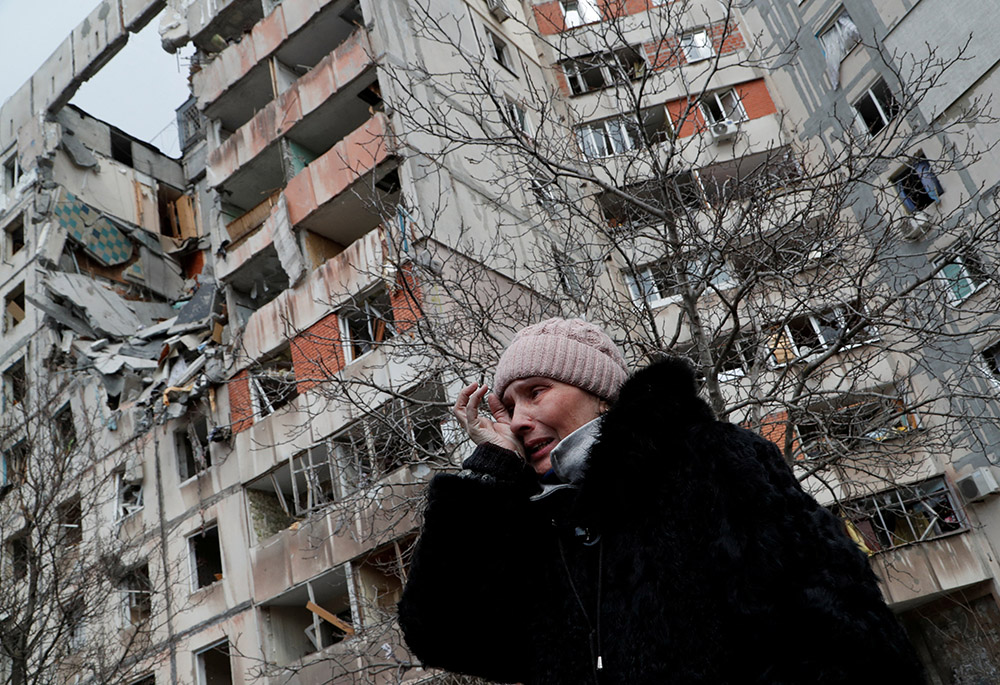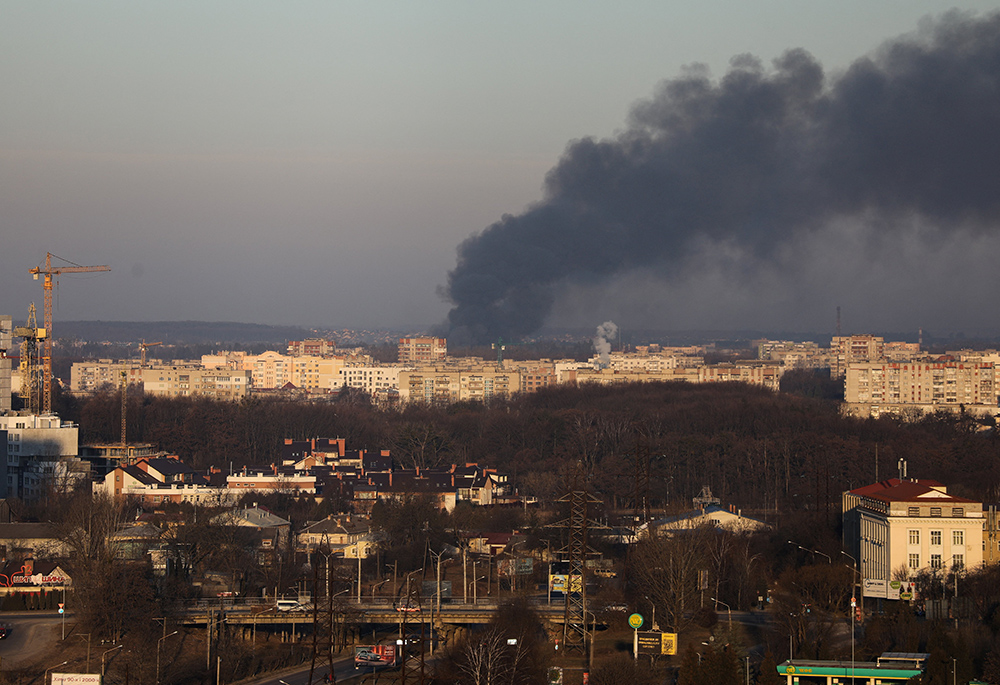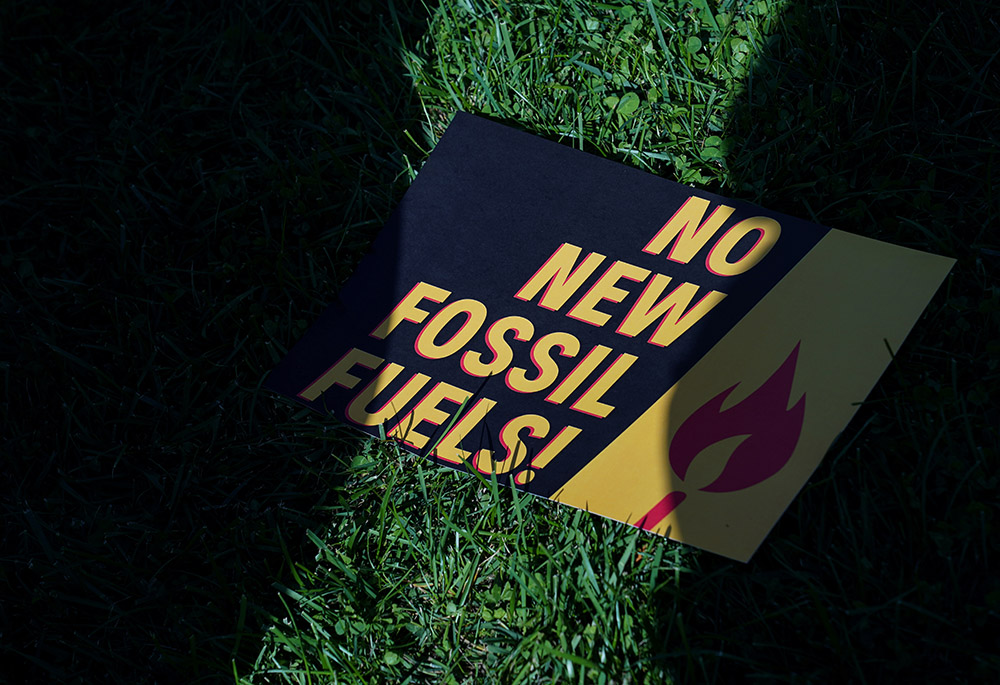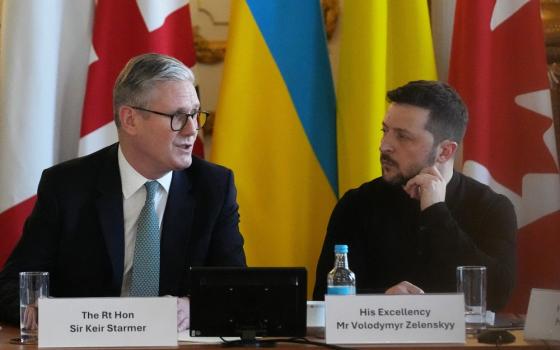
A woman reacts in front of destroyed apartment buildings March 17 in Mariupol, Ukraine. (CNS/Reuters/Alexander Ermochenko)
Ukrainian people continue to resolutely and boldly resist Russia's incessant and atrocious attacks in a war fueled by Russian oil, gas and coal. Among the dreadfully bombarded is the Ukrainian city of Mariupol — "a city of martyrs in the terrible war ravaging Ukraine," as Pope Francis recalled at the conclusion of the Sunday Angelus on March 13, joining his voice to that of the common people who implore an end to the war.
Irrefutably, fossil fuels have become a weapon of mass destruction, both for war in Ukraine and in the climate crisis. Still, we must continue believing that we can overcome not only a war in Ukraine and conflicts in other regions of the world but also our dependency on oil, gas and coal, now and forever.
"For some time we've been speaking on the Fossil Fuel Non-Proliferation Treaty. It will address most of our crises — climate crisis, biodiversity loss, ecological crisis in general and a question of peace," Fr. Joshtrom Isaac Kureethadam, coordinator of ecology and creation at the Vatican Dicastery for Promoting Integral Human Development, pointed out during a Laudato Si' Movement webinar on March 10.
The brutal attack by Russia on Ukraine in combination with speculative price increases and the rebound in demand for oil and gas has led to soaring food and energy prices and market uncertainty across the globe. But at its roots, this is a conflict that has been bankrolled by the coal, oil and gas industries, industries that account for 40% of Russia's federal budget and 60% of Russia's exports.

Smoke rises above buildings near the Lviv airport, as Russia's invasion of Ukraine continues, March 18 in Lviv, Ukraine. (CNS/Reuters/Roman Baluk)
According to Todd Paglia, executive director of Stand.earth, "The conflict clearly shows how dangerous our dependence on a fossil fuel system is, especially one that concentrates power in the hands of someone like Putin."
Any moves by governments around the world to build more fossil fuel infrastructure or failings by governments to enact sanctions on Russian oil and gas imports now would dig us further into conflict, vulnerability and instability — all of which will only worsen the climate crisis. As noted by the United Nations' Secretary-General António Guterres, "Fossil fuels are a dead end — for our planet, for humanity, and yes, for economies," and we must "end all new fossil fuel exploration and production." Ukrainian scientist and Intergovernmental Panel on Climate Change member Svitlana Krakovska echoes this, saying, "The money that's invested in fossil fuels, they're using against us. Against freedom. Against humanity."
For too long, government action has been devastatingly slow and catered to reckless and deceptive fossil fuel corporations, preventing meaningful and timely climate legislation. As highlighted in a letter by faith leaders who are calling for a fossil fuel non-proliferation treaty, "there is a glaring disconnect between countries' approvals for continued fossil fuel expansion and their rhetoric" on climate leadership and commitment to science. Meanwhile the urgency of timely action for a livable planet is increasingly clear.
Advertisement
Fossil fuels are threatening our ability to protect livelihoods, security and the planet. Burning coal, oil and gas is responsible for 86% of carbon dioxide emissions in the past decade. It is the largest driver of the climate crisis, topping the World Economic Forum's annual Global Risks Report consistently for the past several years and named an equivalent if not greater risk to humanity than weapons of mass destruction in 2020.
Russia's war in Ukraine and the rising price of fossil fuels underscore the need for new bold proposals like the Fossil Fuel Non-Proliferation Treaty to phase out oil, gas and coal and rapidly transition the world to cleaner, safer and distributed energy solutions.
The world has used treaties in the past to manage, restrict and phase out dangerous things like nuclear weapons and land mines. But existing climate treaties do not address fossil fuel production proliferation risk. The Paris Agreement fails to mention the words coal, oil, gas or fossil fuels even once, which shows the need for a complementary mechanism to address fossil fuels and the fossil fuel industry head-on.

A sign protesting fossil fuels on the lawn outside of the U.S. Capitol during a protest Oct. 18, 2019, in Washington. (CNS/Reuters/Sarah Silbiger)
Faith institutions have led the way previously on divesting finances from fossil fuels; now they can play a crucial role in building support and momentum by making the moral case for a Fossil Fuel Non-Proliferation Treaty — one commensurate with the scale of the crisis the world is facing. Hundreds of faith-based organizations and faith leaders have already endorsed this call and the cohort continues to grow by the day.
As a faith community, we are called to seek the common good, work toward peace and help those who suffer. This echoes the words of Ukrainian Archbishop Sviatoslav Shevchuk of Kyiv-Halych, whose statement on the attack stresses that this should be a cause of concern for the world, especially for those "who care for the environment, those who care for the ecological awareness of humanity."
The past several weeks have been a whirlwind of processing this new reality: one where I lament the utter devastation hitting my home and one where I am utterly grateful for the camaraderie and eagerness to stand with Ukraine that I've experienced in the most unexpected places.
There is a desperate need and a profound hunger for change — change that starts by adding bold ideas like the Fossil Fuel Non-Proliferation Treaty to our toolbox so we may be good caretakers of our common home.







